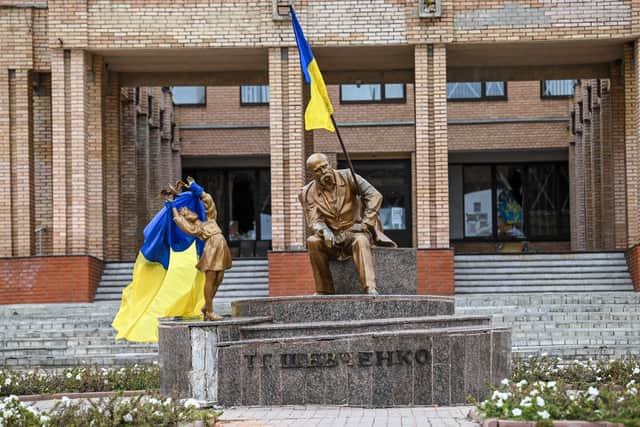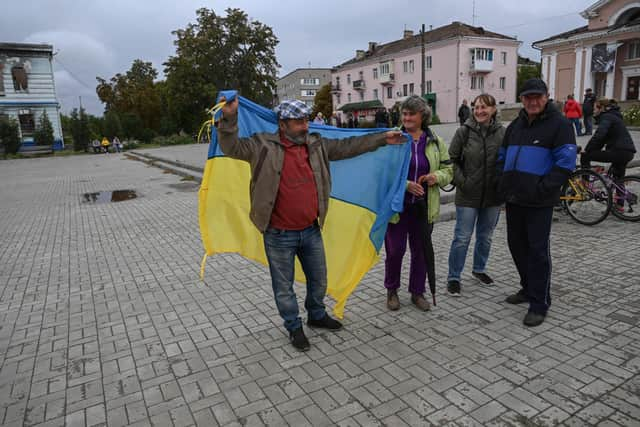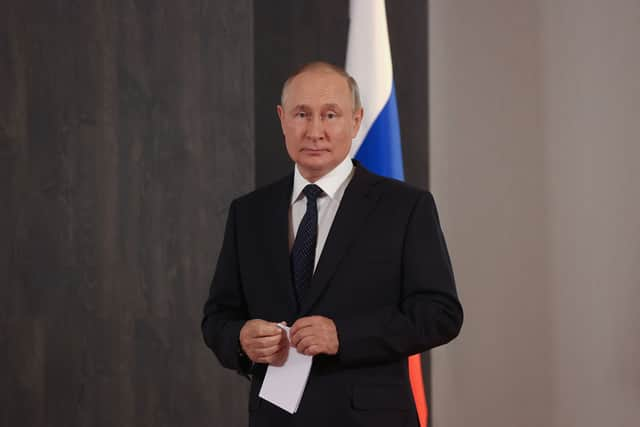Ukraine war: what’s next for Putin and Russia after Ukrainian counter-offensive and liberation of Kharkiv?
and live on Freeview channel 276
The war in Ukraine has moved on in surprising ways, after Ukrainian troops regained previously Russian-occupied areas in the east of the country.
After months of fighting and what looked like a stalemate between the two opposing forces, thousands of Ukrainians have been liberated in the Kharkiv region, an area which has remained Russian-controlled since the early days of the invasion. Ukrainian flags are now flying in the city, and remnants of the Russian occupation, such as discarded military equipment, have been left behind.
Advertisement
Hide AdAdvertisement
Hide AdBut what do the gains in Kharkiv mean for the wider conflict - and what does the Ukrainian advances in the region mean for Putin’s future and his next moves? NationalWorld spoke to James Rogers, co-founder and director of strategy at the Council on Geostrategy, about just what could happen next.
What does the situation in Kharkiv mean for Ukraine war?
Ukrainian troops moved into the Kharkiv region in the east under the cover of proceeding with an offensive in the southern Kherson region. Russia ramped up operations in the south, with Ukraine using military aid sent from the United States, the United Kingdom and other allies to launch a full-scale liberation campaign in the east.
“There’s a great deal of international support coming in for Ukraine, along with the bravery and of course, heroism of the Ukrainian Armed Forces”, Rogers said.
“This has come together to allow Ukraine to seize the initiative and to begin a counter-offensive while Russia has become, in recent months, increasingly bogged down in eastern and southern Ukraine. So this is the situation at play at the moment and the Ukrainians are now pushing east and ultimately south towards perhaps Crimea.”
Advertisement
Hide AdAdvertisement
Hide Ad

According to the Ukrainian Government, the country regained over 3,000 square kilometres of ground.
Rogers explained that the liberation of the Kharkiv region could lead to Ukraine moving in on other targets under Russian control: “They will seek to take control of all of those areas that have been claimed and seized by Russia since late February this year.”
He said that Ukraine is “undoubtedly in a stronger position” following the liberation of Kharkiv. “They’re fighting on their own territory, and they understand the lay of the land so to speak, they understand their own cities.
“It’s increasingly clear that the Russian forces are performing extremely poorly in many cases. And the Russians are increasingly relying on old and antiquated equipment that they’re bringing out of storage to help them fight.
Advertisement
Hide AdAdvertisement
Hide Ad“The situation for the Russians is acute and it can only get worse as the Ukrainians, with support from Europe and North America, push further and further ahead.”
Not only had it proved Ukrainian strength in this conflict, but it has also proved to Ukraine’s allies that the military and financial aid is helping to win the war.
“Some other countries have been less than willing because they've thought that it would prolong the conflict, a conflict which they thought Russia would inevitably win given the stories that have been put forward in recent years about the invincibility of the Russian war machine, but what we're seeing now is that the Russians are performing extremely poorly.”
What will Russia’s next move be?
Although the liberation of Kharkiv is a moment to celebrate for Ukraine, there is almost zero chance of Russia conceding the conflict, despite withdrawing troops from the region. In a statement following the counter-offensive and withdrawal of Russian troops, Igor Konashenkov of the Russian Defence Ministry said: “A decision was made to regroup Russian troops.”
Advertisement
Hide AdAdvertisement
Hide AdWhile his words may be hiding the shock which Russia has experienced from the counter-offensive, it also indicates that the Kremlin isn’t willing to back down from the fight just yet.


“We don’t yet know how far the Kremlin is prepared to go to mobilise all of Russia’s strategic resources to put them into the fight,” Rogers explains.
“It would probably be safe to assume that they may be prepared to do that, but there are some significant impediments. Firstly, the sanctions that the Western powers and others have applied on Russia have really caused some chaos to the Russian economy.
“Russia, unlike the Soviet Union before it, is increasingly reliant on international markets for the provision of various electronic equipment that has been put into the weapons that they produce. So that’s an immediate problem for them. In addition to that, if they were to go for full militarisation, that would have a significant impact on the Russian people who, until now, have been told generally that this is a special military operation.”
Advertisement
Hide AdAdvertisement
Hide AdThe Russian retaliation has already begun in Kharkiv, with Russia targeting an electricity plant there, as well as other Ukrainian-held targets. Ukraine’s Defence Minister, Oleksii Reznikov, also admitted that Ukraine was expecting Russia to fight back, stating forces had to “be ready to defend” the liberated region.
Is Putin’s power in peril?
The situation is undoubtedly a difficult one for Russia, so much so that even the mask of the state-controlled media, which is normally so tightly regulated, has started slipping.
“It’s very difficult to question that regime, although even there we have seen in recent days, some let’s say, not resistance, but certainly some questions being asked about the advisors that have been providing Vladimir Putin with the advice,” Rogers said.
“Commentators have openly questioned, not the president or the regime, but rather the advisors around him and whether they’re competent, which is also a sign of the situation is not all as it seems.”
Advertisement
Hide AdAdvertisement
Hide Ad

Reports from Russian soldiers on the ground to their families, despite only reaching a small percentage of the Russian population, have also shed light on the context of the conflict and just how badly it is going for Putin’s troops. These issues may begin to place question marks over Putin’s decision-making and power within the Russian public.
Rogers explains: “The situation I would say looks quite bleak for the Kremlin - both bleak on the ground in Ukraine and bleak in terms of the Russian nation’s support for this conquest.
“Whether or not it’s the end for Putin yet, I think is a very difficult question to answer. The Russian regime has become increasingly brittle since Putin came to power in the early 2000s.
“So far, when Putin has calculated and he has launched military operations against other countries - whether that’s Georgia in 2008, or Ukraine in 2014, or Syria in 2015 - whenever he has involved the military, and he’s the apparatus of state power of Russian state power overseas, generally it has gone in his favour or at least it is not that significant. This time, it’s completely different.”
Advertisement
Hide AdAdvertisement
Hide AdHe added that the situation will become clearer to Russia that a “miscalculation” has taken place in its invasion of Ukraine compared to previous conflicts under Putin’s leadership: “Not only has Ukraine fought for its survival, but the major Western powers led by Britain and the United States have been prepared to push back and provide the resources to make things very, very difficult for the Russians on the ground.”
The situation in Kharkiv could be the first domino which begins to topple Putin from power, with Rogers explaining that the Russian people may look for a change in leadership after his 22-year stint in the top job in the Kremlin.
However, he cautions that the end of Putin’s reign may not necessarily mean the end of the war: “The issue there of course is that doesn’t necessarily mean that what replaces him if something does replace him is going to be any better than the current regime in the Kremlin. That’s an issue that we have to constantly think about.”
Comment Guidelines
National World encourages reader discussion on our stories. User feedback, insights and back-and-forth exchanges add a rich layer of context to reporting. Please review our Community Guidelines before commenting.
